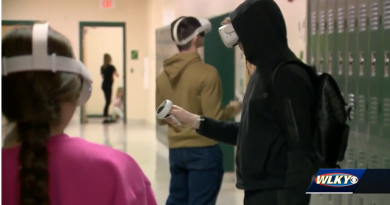Students Are In Financial Crisis. Who Will Save Their Future?
In 2008 we bailed out the banks. We now face the biggest financial crisis in a generation, with record youth unemployment. Who will bail out young people? R29 and Vice are joining the NUS to call for all students to be offered rent rebates and asking the government to bring back maintenance grants for students from low income backgrounds.
Going to university in Britain is expensive. In fact it’s more expensive than it’s ever been. This can be traced back to 2008 when, in the wake of a global financial crash, tuition fees were trebled and 2015 when, as Britain recovered from said financial crash, maintenance grants for students from low income backgrounds were scrapped by then Chancellor George Osborne.
Today’s students pay up to £9,250 a year in tuition fees alone and then have to contend with the cost of living – namely rent and food – on top of that. This means that the average student faces the prospect of graduating with debts of £50,800. All of this was part of an assault on the living standards of young people, who are also forced to grapple with the housing crisis and stagnating wages while the cost of living has continued to rise. Now the coronavirus crisis has come along and deepened the cracks that were already appearing in the fabric of our society, making them impossible to ignore any longer.
As things stand, the National Union of Students (NUS) told us that the average student faces a shortfall between their maintenance loan and the cost of their rent, which is why the maintenance grant was so important for those from low income backgrounds.
In 2020, a parliamentary briefing found that there has been “a gradual real reduction” in the support available to students since the 1960s and noted that what is available today is “not enough to cover student living costs, particularly due to increases in accommodation costs.”
Indeed, one of the government’s own reviews has found that the median outgoings of a full-time student who lives away from home and studies outside of London (where everything is more expensive) is £11,679 a year. That’s significantly higher than the maximum loan amount available each year of £8,700.
That same government report found that 52% of students have to work alongside their studies. Now, many students who relied on shop or bar work to fund themselves during their studies are locked out of that work because of lockdown restrictions and facing financial hardship as a result.
Rent is one of the biggest outgoings students face. The NUS has found that half of student renters spend more than 75% of their monthly income on housing costs. Last November they surveyed students and found that, because of the impact of the coronavirus crisis:
– 22% of student renters have been unable to pay their rent in full over the past four months and that those renting from a private landlord are worst affected.
– Over two thirds of student renters (69%) are concerned about their ability to pay their rent.
– 61% of students say that coronavirus has had some impact on their income.
– 9% of students say they have had to turn to food banks during the pandemic.
And so, all over the country, university students are protesting and staging rent strikes in order to get reductions and rebates to reflect the impact of the pandemic on their finances.
In 2020 and at the beginning of this year, young people were asked to go to university and told it would be okay. There was confusion and chaos in January as Britain grappled with a third lockdown and students were told they could return to their accommodation if necessary but should learn online wherever possible.
This left some at home, paying for accommodation they cannot live in. Those who made it found themselves more or less confined to their expensive rooms – whether in halls or privately rented accommodation – paying for facilities they cannot use as well as lectures and seminars that they can’t physically attend. They are denied social lives because of lockdown restrictions and wondering why they’re there at all, not to mention paying through the nose for a university experience which only really exists digitally.
Raising tuition fees turned higher education into a market and students into consumers. And like anyone paying for a service, they’re questioning whether what they’re getting in return is value for money.
The Resolution Foundation (a prominent think tank) has issued a stark warning: youth unemployment will not return to its pre-pandemic level for at least another four years. They have predicted that unemployment among 18 to 29-year-olds will soar to a high of 17% before falling back to 7% by 2024, which is still higher than the pre-coronavirus rate of 5.5% in the summer of 2019. We have not seen anything like this since the 1980s jobs crisis. And those who are able to find work are likely to suffer reduced pay. Let’s not forget that it took almost a decade for graduate wages to recover after 2008.
And so this generation – now dubbed the Class of COVID – is looking at the future and questioning whether the hefty investment they’re making in their education will actually pay off. We all face uncertainty but young people know that it might take a decade for their fortunes to recover from the financial fallout of the pandemic. The consequences of this crisis are far-reaching, not least for the wellbeing of a generation of young people who, perhaps even more so than the class of 2008, are being robbed of their youth, of their future.
Some universities are now calling for the interest on tuition fees to be scrapped for the academic years affected by coronavirus. But is that enough? In 2008 we bailed out the banks. We now face the biggest financial crisis in a generation so what about young people? The government has announced a £50 million hardship fund for students in England, while the Welsh government has announced £40m. However, the NUS says this simply isn’t enough.
NUS President Larissa Kennedy explains that the £50m fund “would not even be enough to cover one month’s rent for those in rent arrears in the private rented sector and will not tackle the scale of the issue.” She says: “If Westminster did the right thing and matched the hardship funding being made available in Wales for students, the amount needed would be more than £700m.”
This is why Refinery29 UK, Vice and the NUS are joining forces and calling on the government to support students properly. Together, we are asking for:
– The government to ask university accommodation providers and owners of student private halls nationally to agree to rent rebates to all students and to make it clear to private student landlords that they should do the same.
– The government to bring back maintenance grants so that students from low income backgrounds never again bear the brunt of an economic crisis.
You can sign the NUS petition calling for these measures here.
NUS President Larissa Kennedy said:
“Students have been consistently exploited and ignored during this pandemic. We are seen as cash cows, with many stuck paying extortionate rents for properties they either cannot use or cannot afford; the government’s refusal to invest in ending digital poverty has left many unable to learn because of a lack of technology and all of this is worsening a pre-existing mental health crisis.
“The £50 million provided would not even be enough to cover one month’s rent for those in rent arrears in the private rented sector and will not tackle the scale of the issue. If Westminster did the right thing and matched the hardship funding being made available in Wales for students, the amount needed would be more than £700 million.
“COVID-19 has exposed and exacerbated fundamental flaws in the student housing sector but there are deeper problems rotting at the core. We have inherited student finance and student housing systems that see students as pound signs rather than people.”
Labour’s Shadow Minister for Universities Emma Hardy said:
“The government’s failure to control the spread of the virus is denying students the university experience they deserve. It is clearly unjust that many students are paying for housing that the government is telling them not to return to.
“Some universities and purpose-built student accommodation providers are now offering their student tenants rent reductions, the government should be making clear that everyone – including private landlords – should follow their example.
“Young people have been abandoned by the Conservatives throughout this pandemic, with jobs and training opportunities lost, an exams fiasco and disruption to college and university studies.
“Those in the private rented sector, including students, are feeling the brunt of the government’s failure to fix our broken housing system, paying high rents for often poor-quality accommodation.
“Students’ future opportunities must not be the price they pay for the government’s incompetent response to this pandemic. With young people set to foot the bill for this crisis for decades to come, ministers must ensure all young people receive the support they deserve.”
Generation Rent, who lobby the government on behalf of renters, said:
“Students have been greatly let down at every stage of the coronavirus pandemic. With the vast majority also being private renters, they have been doubly affected by the failings of the government.
“Youth unemployment is at record levels and universal credit, while not substantial enough to give renters the support they need anyway, is completely inaccessible to students.
“The question must be asked, without work, without welfare support and without reductions to rent, how can these students stay out of rent arrears? For many, the answer is they simply cannot. That’s why Generation Rent is backing the call for all students to be offered rent rebates and for the government to bring back maintenance grants for students from low income backgrounds.”
Universities Minister Michelle Donelan said:
“This continues to be an incredibly difficult and challenging time for our students, and I am hugely grateful to all the university staff working hard to prioritise their health, wellbeing and learning during this pandemic.
“The additional £50 million that we are announcing today will mean we have distributed £70m for hardship in this financial year alone – on top of the £256m of government-funded student premium which universities can use for student support this academic year.
“This additional support will provide real, tangible help for those students struggling financially as a result of the pandemic.”
“We will continue to prioritise a full return to education as soon as possible, in line with public health advice. I am also working with universities and professional bodies to ensure students can graduate as planned.”
Source: https://www.refinery29.com/en-gb/students-deserve-better-campaign?utm_medium=10todayuk.20210211&utm_source=email&utm_content=article&utm_campaign=10todayuk




